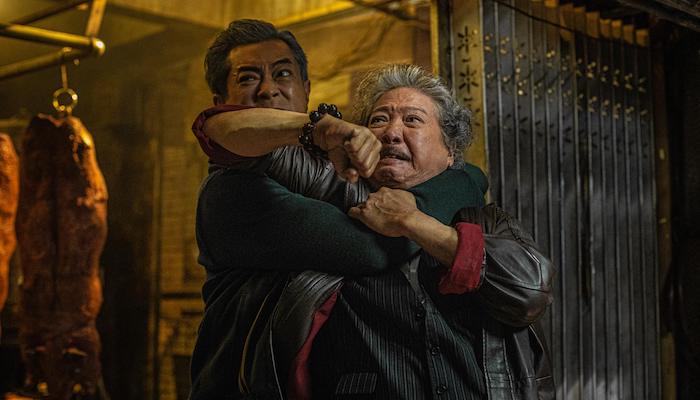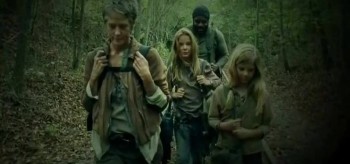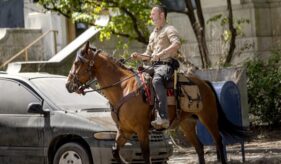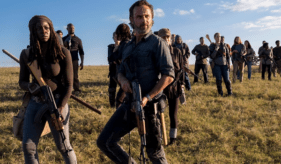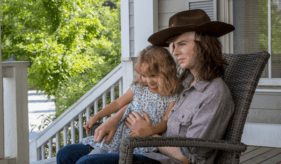TV Review: THE WALKING DEAD: Season 4, Episode 14: The Grove [AMC]
AMC’s The Walking Dead The Grove TV Show Review. The Walking Dead: Season 4, Episode 14: ‘The Grove’ managed to salvage a surprise from a scenario many may have seen coming, from a long way aways. I considered myself to be amongst them, and even I couldn’t find anything insightful (or particularly articulate) to yell out loud, when that moment came. As I recall, baby Judith may have said more with a look, than I could have put into words. The look said something to the effect of: “What are you waiting for? Shoot her!” – but I’m getting way ahead of myself….
‘The Grove’ was a classic case of shock; the kind where you are fully aware of your situation, but the gravity of the matter doesn’t take hold until it is laid out before you. This was a story that needed to be unfolded at its own pace, I suppose. Not to be critiqued, so much, as broken down and reflected upon.
Here, then, is as coherent a breakdown as I could come up with, for Carol (Melissa McBride), Tyreese (Chad L. Coleman), Mika (Kyla Kenedy), and Lizzie’s (Brighton Sharbino) turn for both this arc, and this season, of The Walking Dead.
Story time continues…
Lizzie seemed proud of having killed two people, for Ty’s sake, but voiced regret at one of those kills having been a head shot. I had to forgive Carol for missing the gravity of that aside; I hadn’t yet the frame of reference to appreciate it, myself. Carol later filled in the ending to Huck Finn, and the girls rationalized which of the two they each were. A post card moment that would be the core of the episode’s major problem for everyone at hand. Carol seemed to be under the impression that they were carrying on from where they had all left off. The girls, however, had time to evolve and refine their individual World views.
Everywhere you go, there they are.
With Carol focused on the girls as she knew them, starting with Mika, and Ty focused on Judith, Walkers would serve as both a driving force and character catalyst, for the episode. One Walker, in particular, got things rolling; hobbled on the tracks, it allowed Lizzie to make a case for restraint. It would become the focal point, however, for Mika and Lizzie’s differences. The girls understood the fundamentals of these differences in ways Carol was only beginning to take stock of, by the time she was banished, but were now head-to-head. Mika’s strength fed a pacifism that left her vulnerable to other Humans; Lizzie’s strength came at her fellow Humans’ expense. Each was prepared to take drastic action, as they saw fit, but Lizzie would be the one sufficiently provoked into taking such action. For every Walker she could not save, the more important it became that the others be made to see Walkers the way she did.
The arrival of a small band of Walkers, burnt from a fire the group had been keeping track of, by its smoke, momentarily put everyone on the same page. As encouraging as that was for Carol, the dynamic between the girls remained the same. I couldn’t help but consider the possibility that this contingent of well-done Walkers got their five alarm rating from the fire that Daryl & Beth set( at the end of ‘Still,’ which did draw a herd’s attention). As with the episode ‘After,’ that notion allowed for a sense of scale, both in time & space, that framed the events of this single episode in the larger context of the ongoing arc. For ‘The Grove,’ however, context extended all the way back to The Walking Dead‘s second season.
Mean bones.
The specter of Sophia never went away, for Carol; the loss only serving to inspire a hard shift, from coddling protector, to active defender. As driven as she had been, in pursuing this new outlook for the sake of the whole group, Carol had taken a particular interest in the sisters. As disturbing as Lizzie’s fixation on Walkers was, along with Mika’s description of her as “messed up in the head,” Lizzie got a pass for being ruthless. Carol just didn’t see Mika’s sensibility as a survivalist virtue, equating her not having “a single mean bone in her body” with the helplessness that cost Sophia her life.
Carol’s mistake was equating “meanness” with strength. As appreciative as Carol was, of Mika’s ability to contend with Walkers, she was fixated on Mika’s pacifism. That fixation left a blind spot towards Lizzie’s perceived strength for what it was. An indifference to – if not open contempt for – her fellow man.
I’m guessing Ty had not been around children saying the darnedest things, all that much; his looks of WTF were coming way too often to mean otherwise. Sadly, it would become a regular expression for Ty, and not just restricted to the girls. Wild looks of concern, fear, and rage, did not change the fact that, after Mika, Ty was still the gentlest soul of the group (Judith doesn’t count). That gentleness, under the rage he had been carrying, since Karen’s death, would count for a lot, later on; but not before Ty got a better sense of what he had gotten in the middle of, since leaving the prison.
Off the bat, Carol had assumed that Mika was still the weaker of the two, and singled her out for a reality check. Reality, however, seemed determined to reinforce each of the girls’ beliefs. Mika and Carol stumbled upon a potential safe haven, which served to prove Mika’s counterpoint to Carol.
“Everything always works out the way it’s supposed to.”
From this, arguably the most idyllic setting any of the groups had come across, the Prison arc theme (of making a paradise in Hell) was revisited; with it, came old habits, and old dread.
Lizzie was confirmed as the fence feeder, back at the prison, but that should have surprised no one. If ‘After’ was any indication, she had been keeping up her practice on rodents (as with the dissection scene Ty had come across, back at the prison). Mika resumed her role as Lizzie’s handler, where Human interaction was concerned, and fancied the prospect of living vegetarian.
Ty resurrected the specter of Karen to Carol, who may have drawn upon her own thoughts of Sophia to put the matter aside. Atonement for Sophia may have been one of the reasons Carol took it upon herself to “properly” train the children of the prison. Here, now, was an opportunity to resume that training; but after noting some of the girls’ old habits, a re-evaluation was in order.
Essentially, this meant Carol taking the girls, in turn, out to the wood shed. The weak link needed to be rooted out and brought up to code. Carol’s goal had always been survival of the fittest; viewing such weak links as threats to the group. The problem is that such a simple outlook required a stark and easily simplified circumstance. What Carol had not counted on was just how even a handicap each girl had become.
It struck me as contrivedly convenient that the girls would be so diametrically opposed; but I reckon this was done entirely for Carol’s sake. Carol needed black & white scenarios, in which snap decisions could be made. Painting the girls in mirrored halves of both colors was supposed to keep Carol second guessing just long enough for events to unfold in ways she could not foresee. It was just the way things had to go for Carol, the girls, and Ty to resolve their differences.
Lizzie goes Borden.
Suffice to say, Lizzie had been doing more than just entertaining her Walker fantasy, back at the prison. Lizzie no longer just sympathized with the Walkers, she identified with them – thought of them as better off, somehow. In her zeal to impart strong survival instincts, within the girls, Carol failed to account for how that survival would be applied/ exercised. If Mika thought that all life had to be preserved, but at the expense of Walkers, then Lizzie saw people as the problem, while Walkers were a purer form of being, attained through death.
Once it became clear that the girls were evenly matched, in fitness & flaw, Carol sought to encourage the complimentary aspect of their strengths. Unfortunately, all that empowerment tends to compel people like Lizzie to prove both their case and their convictions with decisive action.
“Look at the flowers.”
Lizzie, once Carol’s greatest achievement – an atonement for Sophia – was now her greatest failing.
I had mentioned Mika serving as Lizzie’s handler. It was brought to my attention, later, that Lizzie had been instructed to “look at the flowers” once before. This was when their father passed, and Lizzie couldn’t secure his lasting death. Clearly, Mika had inherited a history of Lizzie behavioral problems, that Carol only got a glimpse of, before being separated from them.
Despite everything that went into Carol’s reinvention of herself, as a hardened, unsentimental survivalist, there was still a core of hope to her efforts. Hope for her own redemption, as a failed mother; hope for a legacy of stronger survivors; maybe even hope that some provable good could come from all the bad she has done/ will have to do. Even if that last scenario turned out to be the one that blinded her to the dark outcome, of Lizzie’s demented innocence, there was still some hope evidenced in how she regarded that innocence, and how she carried out the necessary response to it.
Perhaps for her own sake, Carol saw to it that the Lamb did not see the blade.
Atonement.
Carol had a previous opportunity to come clean to Ty, but did not take it. This was not cowardice, it was Carol believing that her role was still too important to risk on an act of conscience. Now that she considered herself as part of the problem, self-preservation flew in the face of her own ideals. It was the right decision. By then, Ty had seen, first hand, the lengths Carol was willing to go to. It’s easier to accept loss at the hands of someone willing to suffer loss for the same reason. For all the rage and pain he felt, Ty had come to realize that Carol’s dedication to the greater good was necessary. Whether a momentary consideration, or a lasting pardon, time will tell.
If Rick could not abide Carol’s presence within the group, for Judith’s sake, Ty may have come to the opposite conclusion. There was heartbreaking work to be done, and a still potentially hazardous journey to complete, with a baby in tow.
People change.
‘The Grove’ may have been the single most important episode, since the prison. At a stroke, it addressed most of the intrigues of season 4, suggesting a relatively clean slate for the next arc. With this episode, Ty and Carol may have gotten past her murder of Karen. At this point, Carol may have suffered enough, in her exile, to be welcomed back by Rick – delivering Judith, safe & sound, likely going a long way, to that end. The episode also brought back a question I had not asked myself since Sophia’s passing. What’s left for Generation Z?
Unless a new crop of younglings are introduced, at Terminus, Carl is once more the only representative of Generation Z (again, Judith doesn’t count). A part of me wanted all of these kids to survive – not for squeamish or sentimental reasons, but because I wanted to see what the World would make of this generation, and vice versa. I wanted to see what a full grown Carl, crossing paths with a full grown Lizzie, would bring. I wanted this show – this setting – to have a tangible future. I got greedy.
The Walking Dead is about the here-and-now. No future is in sight, and everyone is as good as dead; the only remaining detail to work out being the when, where, and how. They have to deal with it; so do I.
That said, let’s see just what else the show could possible do to one up this episode.
For more The Walking Dead reviews, photos, videos, and information, visit our The Walking Dead Page, subscribe to us by Email, “follow” us on Twitter, Tumblr, or “like” us on Facebook.
Related Articles
FilmBook's Newsletter
Subscribe to FilmBook’s Daily Newsletter for the latest news!




